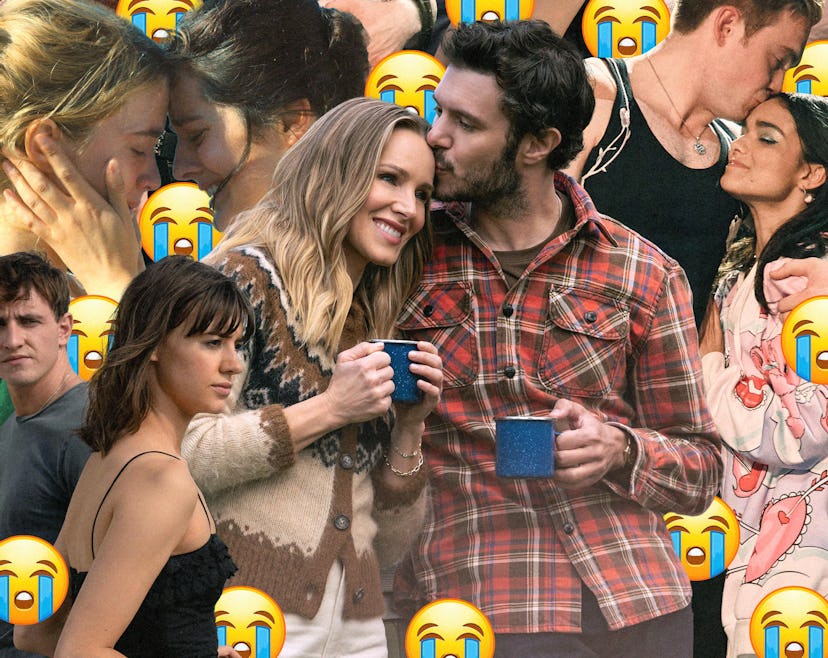TV & Movies
There’s A Reason Why You Love Doomed Romance
The madcap enthusiasm for Nobody Wants This points to a romantic trope that’s back in full force.

It’s fall, and while the season is all about reinvention, it’s also a time for moodiness. For cozy wallowing. For longing. For watching the All Too Well music video and crying into a bowl of soup. And nothing matches this vibe better than doomed love stories, which might be why everyone is watching Nobody Wants This.
The Netflix rom-com, which was streamed for a collective 1.7 billion minutes, follows an agnostic-at-best sex and relationships podcaster, Joanne (Kristen Bell), who falls for a smokin’ hot rabbi, Noah (Adam Brody). Noah can’t — or at least won’t — marry a goy, and Joanne has only a very mild interest in converting to Judaism, a rigorous process even if you’re into the idea.
Despite the upbeat ending of the 10-episode first season, they are, it should be understood, doomed. Netflix announced on Oct. 10 that Season 2 is coming, and we all know this upbeat ending won’t last long.
Doomed romance isn’t a revelatory theme — look to Tristan and Isolde, Héloïse and Alberd, or Marc Antony and Cleopatra — but creatives are leaning especially hard into the trope this season. A Broadway revival of Romeo and Juliet, arguably the most famous English-language love story of all, is running at New York’s Circle in the Square Theatre. With music from Jack Antonoff, the show stars Kit Connor and Rachel Zegler, who’s fast becoming a poster girl for the Shakespeare story, having also starred in 2021’s West Side Story. And I’m fully prepared to ugly cry when Andrew Garfield and Florence Pugh’s We Live in Time hits theaters on October 11.
So say goodbye to the fun, bubbly love of summer. Fall is here, and it’s time to hurt our own feelings. Cue up Certified Fall Classic Normal People or hit play on “Stick Season.” As Noah Kahan has taught us, it’s time for plaintive yearning. Or as Shakespeare put it, “such sweet sorrow.”
“It is both cathartic to cry and cathartic to see a storyline that you know will get fulfilled.”
“It’s like something in your bones, that you know the formula of the tragedy,” says writer Amy Silverberg, who holds a Ph.D. in literature and creative writing.
For four years, the Los Angeles-based writer has been a professional book club facilitator. Recently one of her groups read Leaving by Roxanna Robinson, a book with a very doomed romance. “Half of the women were so upset that he dies at the end, but half of them were like, ‘Oh, I saw that coming.’” The ones who did, she says, inherently understood tragic structure, even if they’d never studied it. “It is both cathartic to cry and cathartic to see a storyline that you know will get fulfilled.”
Even outside of the trope’s familiarity, there’s something deeply romantic about going into a relationship and trying, even if it won’t work. Romance is about effort and, as Esther Perel frequently points out, desire is about wanting, not about having.
I’ve spent the past eight years writing columns about sex and relationships for outlets like Bustle and GQ. People frequently write in about their own doomed loves, whether present or past. They want to be assured that a love across countries, cultures, or classes will somehow work. Or that a vacation fling was worth having, even if it ended. The experience is universal: To live is to lose love.
Perhaps we like watching lost, doomed love because we have all lost love before. The conceit of these stories — that a relationship that ends is still worth something — is comforting. In a lot of cases, especially in historical or queer love stories, the love left behind is richer or more real than whatever comes after it.
I spent all of Portrait of a Lady on Fire making elaborate plans for how Héloïse and Marrianne could be together in 1770s France. And sure, it’s cute that Harry runs after Sally on New Year's Eve, but it scrapes the insides of you out like a jack-o-lantern when Gatsby keeps a dumb green light going on his dock.
Sometimes, it seems, we all just want to pick at our own wounds. To scream-sing to Lewis Capaldi. To root for those two crazy kids in Titanic, who aren’t making it out of the ocean together. Or to experience Adam Brody telling Kristen Bell to “hand me your ice cream,” before delivering an all-time great on-screen kiss, knowing heartache is on the horizon.